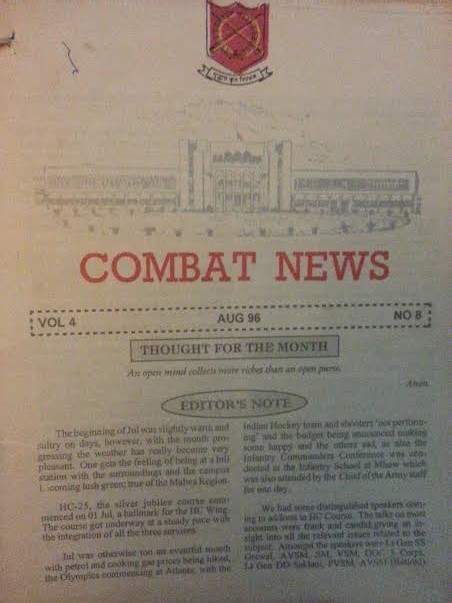I underwent the Higher Command Course with the Army from Jul 1996 to May 1997 (HC 25, that is) in the College of Combat (presently called the Army War College) at Mhow, near Indore in Madhya Pradesh. In our course, there were 37 officers from the Army, six from the IAF and two from the Navy. My first humorous article that appeared in Aug 1996 issue of Combat News is reproduced below.
Just before coming for the HC-25, friends gathered around me, with drinks in their hands, re-enacting ‘The Last Supper’. Naturally, the conversation veered around to the Army and their ‘peculiar habits’. It was unknown territory. “Basically, they are nice people,” said one in the manner of a visitor consoling a cancer patient, “And you have nothing to worry”. A civilian friend wanted me to confirm (“just to settle a bet”) if the Army men did everything with their boots on.
After having spent the first month here, I am able to report back that I have met some of the nicest people, who are as normal and professional (if not more) as we pretend to be. The main thing different or peculiar, I found, is the Army’s penchant to use abbreviations and acronyms – a sort of ‘bikini speech’ clothed in minimum words and that too shortened. It is rumoured that our SI (South Indian) Army friends cannot enjoy their food unless they have RSVP, ie, Rasam Sapadam, Varellum, Papadam; and those from P, H and D prefer PPK, ie, Papad, Pickle and Kuchamber.
Human mind has marvelous adaptability. Very soon I got used to living in KLP rather than in an officers’ mess, the former being in more of a mess than the latter. Nowadays, when someone speaks of the ‘conc area’, I am not reminded of the pogroms and when I see ‘junc’ written on a map, I do not associate it with a scrapyard.
Sometimes, of course, various explanations come to my mind as to why the bikini speech. The English language and literati owe a lot to the nautical terms and phrases which are in common usage now. Bikini Speech may be Army’s way of Indianising the English language. After all, how many of the English and the Chinese will be able to identify with the English and Chinese foods that we serve in our messes? On the other hand, the Army man may actually be in a hurry (note how they have changed even short words like night and enemy into shorter ni and en), expecting a ‘short and swift battle’ as the cliche goes. But then an incoming Exocet missile would give only 45 to 60 seconds reaction time before it hits a ship and still we have the time to say ‘Aye-aye Sir’ or acknowledge (not ack) a report by saying “Very Good”.

It may be to inculcate brevity? But this could not be the case. The Army orders are really very long and exhaustive. In Staff College, for example, when we were dumbfounded by nine pages of ‘Parking Instrs’, full of abbreviated words, we asked an Army officer to decipher. He quickly went through the edict and summed up, “Parking anywhere in the College, by student officers, is forbidden”.
Are we selectively brief exhorting our juniors to employ the bikini speech so that we will not have to read lots of junc – sorry – junk? A little FFT (Food For Thought). Whatever be the explanation, the sys appears to work in the Army. So press on Army. Maybe you can prove the makers of MR Coffee wrong and real pleasure may actually be in an ‘instant’. (This was a take on the MR Coffee ad that became quite controversial since it hit instant coffee so suggestively. I am reproducing the ad of those days starring Malaika Arora and Arbaz Khan):

P.S. By publishing this item in the Combat News the Army has proved that they are very nice people indeed but that henceforth, I should avoid conc areas in dark alleys, when they have their boots on (which is all the times).

Sir, seems I have read this before !!!
Must have appeared as a post in HIAOOU.
Ah, yes.
Humour is the backbone of speeches (and your writings , of course, irrespective of the fact if they are bikini or maxis !
Thank you John for always being encoyraging of my efforts
Really clean web site, thanks for this post.
Thank you